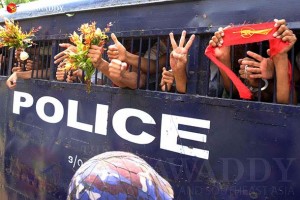Burma – Where Classrooms are replaced with Jail Cells
By Burma Partnership • July 10, 2015 On 2 July 2015, five student protestors were charged under the controversial Peaceful Assembly and Procession Law for taking part in a protest concerning the overpowering influence of the Burma Army in Parliament. An additional four students were arrested after being involved in a graffiti protest on the campus of Yadanabon University in Mandalay. The demonstrations came as a result of the ongoing detention and subsequent unfair trials of students protesting the national education law along with the failure of Parliament to pass five out of six proposed amendments to the 2008 Constitution, most notably Article 436.
On 2 July 2015, five student protestors were charged under the controversial Peaceful Assembly and Procession Law for taking part in a protest concerning the overpowering influence of the Burma Army in Parliament. An additional four students were arrested after being involved in a graffiti protest on the campus of Yadanabon University in Mandalay. The demonstrations came as a result of the ongoing detention and subsequent unfair trials of students protesting the national education law along with the failure of Parliament to pass five out of six proposed amendments to the 2008 Constitution, most notably Article 436.
The amendments to Article 436 call for a reduction of the threshold 75% of votes in Parliament that are required for constitutional amendment to be lowered to 70%. By failing to alter this requirement, the Burma Army – which maintains a powerful 25% bloc in Parliament – has preserved their ability to veto legislation. Though the constitutional amendment bill shared support from MPs in both the ruling Union Solidarity and Development Party and the opposition National League for Democracy (NLD), its failure is a sign that the military is not yet ready to give up its dictatorial influence over Parliament, or more broadly, in Burma’s political sphere.
Those following Burma’s political transition know that this is not the first time that the Burma Government has utilized the Peaceful Assembly and Peaceful Procession Law to suppress activists and restrict the right to freedom of expression in the country. On 10 March of this year, around 200 students took part in a protest against the National Education Law in Letpadan, resulting in a violent crackdown by the police and the arrest of more than 100 of the activists. Previously, Brad Adams, Asia Director for Human Rights Watch stated, “Burmese authorities are escalating arrest of people protesting peacefully over things like land and education. Many have been sentenced to ridiculous prison sentences, undercutting government claims that it is genuinely reformist.”
Most concerning, however, is the treatment of the activists still remaining in prison, almost four months after the Letpadan protest originally took place. According to the Assistance Association of Political Prisoners, two of these prisoners, Tin Win and Khin Hliang, are facing deteriorating health conditions as a result of the violence they suffered during the police clampdown on 10 March, along with the grim conditions they face while in prison. This past week had also seen seven of the student activists placed in solitary confinement on questionable grounds.
The influence of the Burma Army is likely to prompt further political unrest in Burma, especially as General Elections loom in November. Another proposed constitutional amendment, which would provide state parliaments with the authority to choose their own Chief Ministers, will likely be blocked by the Burma Army when the bill is debated later this week. For ethnic minority leaders, this decision prevents them from acting autonomously and further centralizes power in the Army-controlled Executive.
Currently, 170 political prisoners remain jailed, with another 437 awaiting trial, for peacefully speaking out against the often harsh and authoritarian practices of the Burma Government. The disturbing lack of freedom of expression and assembly – coupled with the overarching power of the Burma Army– posits serious questions regarding the upcoming General Elections. Parliament has already voted to deny Aung San Suu Kyi the option of running for President as leader of the opposition party, and further limitations, such as confusing and incomplete voter registration lists, continue to arise.
If the supposedly reformist Burma Government is serious about committing to the transition to democracy, it must begin by decentralizing and reducing the power of the Burma Army and encouraging a greater space for dissenting voices in civil society to come forward. Among a range of preconditions, it is essential that the Burma Government releases all political prisoners and drops charges against those awaiting trial if they are serious about the upcoming elections being free and fair. Otherwise, the General Elections will go the way that other “democratic” institutions in the country have gone – amounting to little more than simple window dressing.
Last week’s Weekly Highlight was delayed due to technical difficulties with our website. We are sorry for the inconvenience and look forward to providing you with up-to-date and timely information on the situation in Burma this week.
Since Monday 6 July when this Weekly Highlight was originally written, another five protestors have been sentenced under the Peaceful Assembly and Procession Law for their involvement in a demonstration condemning the Letpadan arrests along with the need for amendments to the National Education Law. The five student activists were part of the Tavoy University Students Union and have all agreed to pay a 30,000-kyat fine as a result of the charges brought against them. According to Assistance Association for Political Prisoners,169 political prisoners remain jailed, with another 446 awaiting trial.
This post is in: Blog
Related PostsMyanmar: Release Four “Rohingya Calendar” Political Prisoners
Burma: Rights Priorities for New Government
Myanmar: Scrap or Amend new Law that could Grant Immunity to Former Presidents
Burma Army Moves to Tighten Grip on Power
Sounds of War Taint the Cheers of Election Success









 All posts
All posts